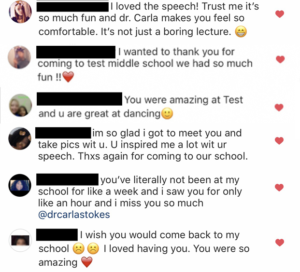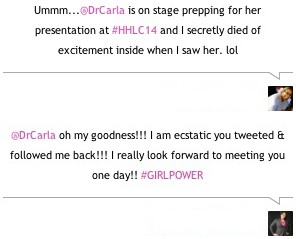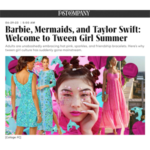What does Ph.D., M.P.H. Mean?
I earned Doctor of Philosophy (Ph.D.) (with distinction) and Master of Public Health (M.P.H.) degrees in Health Behavior and Health Education, with a minor in Social Work from the University of Michigan (consistently ranked in the top five schools of public health and social work in the U.S.).
Read more about careers in public health.
I have a question about HOTGIRLS’ programs:
This Dr.Carla.com web site is intended for those who are interested in my consulting, coaching, and speaking services and programs. If you have questions about HOTGIRLS’ programs, please visit the official HOTGIRLS web site for more information or to submit your question(s) directly to the appropriate recipient. Thank you in advance for your cooperation.
Can you teach me how to become a more effective mentor, educator, or girl advocate?
In response to frequent inquiries from women about how to create, expand, or improve programs for girls, I am planning to offer teleseminars, webinars, coaching/mentoring programs, workshops, and other resources for educators and girl advocates in the coming months.
I am also developing a curriculum based on my pioneering research and work with girls for educators and girl advocates to implement in their own communities. Stay tuned!
Please sign up for my mailing list to receive periodic updates (be sure to check the box for “Educators & Girl Advocates”) and feel free to contact me with any questions or suggestions.
How Do I Become a Life Coach?
If you are interested in becoming a life coach, I recommend pursuing formal training and certification. There are reputable life coaching training and certification programs available all around the world. I recommend searching the International Coach Federation web site for more information.
How can I obtain a copy of your article, “Representin’ in cyberspace: Sexual scripts, self-definition, and hip hop culture in black American adolescent girls’ home pages”?
This article is available online: Download the article
Contact me if you are unable to obtain a copy of the article using the above link.
How Do I Start a Tax-Exempt Nonprofit Organization in the United States?
Starting and running a nonprofit organization is a major undertaking that requires a serious commitment, time, and hard work to build a sustainable organization. While it is true that 501(c)(3) status offers benefits such as tax deductions for donors and private and public grant money eligibility, grant funding from private foundations is declining, can take years to obtain, is highly competitive, and is not guaranteed. Moreover, in recent years, many nonprofits are facing financial difficulties, have laid off staff, or have closed their doors as the number of donors and size of donations has declined due to the state of the economy. In addition, there are a lot of rules and regulations that charities must abide by in order to stay in compliance with the IRS, maintain tax-exempt status, and satisfy funding requirements. I don’t want to discourage anyone from creating a nonprofit if that is your dream, I just want to present the reality to make sure that you are informed before you file your paperwork.
Before starting a nonprofit, I recommend exploring alternative ways to make a difference in your community. You can make a positive impact by volunteering with existing organizations, partnering with a fiscal sponsor, starting a program at your school, church, or synagogue, or even starting a socially responsible for-profit company to solve a social problem or achieve social change. Many people do not realize that there are a lot of great programs, organizations, and initiatives that empower women, youth, and girls that do not have 501(c)(3) status.
If you are seriously committed to forming a nonprofit, I strongly recommend finding out as much as you can about nonprofit organizations and 501 (c)(3) status before filing any paperwork. There is a wealth of information available online, in book stores, at your local library, and at your local center for nonprofits (google is a great place to start). I also highly recommend exploring social entrepreneurship and alternative business entity structures (i.e., Limited Liability Company, S-Corporation, etc.) to ensure that you make an informed decision. Finally, talk to nonprofit founders/executives and consult with a qualified attorney and/or accountant before setting up a nonprofit or any other business entity! (I am not qualified to give legal or accounting advice).
Here are some resources I recommend to help you get started:
- How to Form a Nonprofit Corporation by Anthony Mancuso
- The Revolution Will Not Be Funded: Beyond the Nonprofit Industrial Complex – A great reality check!
I hope that this information helps you learn from my experience and hopefully bypass some headaches. If you’d like to learn more, sign up for my e-mail newsletter for girl advocates to receive updates about upcoming coaching, consulting, and training programs I may offer to help you get your program up and running or take your existing program to the next level.
Can you give me advice about my career…..read my admissions essay……mentor me….help me with my thesis…meet with me…..?
I have been in your shoes and sincerely wish I had time to call, meet with, and help each person who contacts me seeking mentoring, career advice, and feedback on admissions essays, papers, and thesis projects. However, I have reached the stage in my career where I am only able to offer mentoring through my coaching programs. In the future, I may offer periodic Q&A calls as my schedule permits. Please sign up for my email newsletter for updates.
If you are interested in volunteer or unpaid internship opportunities, please contact us and provide detailed information about your experience, interests, and any requirements (a resume, application, and interview will also be required).
Can you give me career advice and/or information about public health internships and career paths for students of color?
I am encouraged by the inquiries I receive from prospective students who are interested in pursuing a career in public health. When I first became interested in public health in the 90’s, there were few opportunities available for undergraduates at HBCUs (historically black colleges and universities). I was introduced to the field of public health when my older sister’s best friend was admitted to the M.P.H. program at the University of Michigan during my freshman year at Spelman College (we volunteered together as peer health educators at an Atlanta middle school). Here are some great resources:
- Association of Schools of Public Health – Information about public health schools, careers, internships, and more [I completed an ASPH internship at the Centers for Disease Control and Prevention while I was pursuing my Master of Public Health (M.P.H.) degree at the University of Michigan]
- Emory Public Health Employment Connection – Public health internships and job listings
- The Black Young Professionals’ Public Health Network, Inc. – This group was started in 2001 by a few of my former classmates at the University of Michigan School of Public Health “in recognition of an increased need for more deliberate and concerted opportunities for professional development of African Americans in the American Public Health Association and in the public health field.” By signing up for the e-mail list, you will have access to public health-related news, employment/internship postings, and hundreds of public health professionals from a variety of disciplines.
Other Questions?
Thank you for your interest in my work. If your question was not answered above, please contact me via email! I will try my best to answer it on this page or in my blog.
I am looking forward to hearing from you!
With encouragement and gratitude,
![]()





 Facebook
Facebook Twitter
Twitter LinkedIn
LinkedIn Pinterest
Pinterest Youtube
Youtube Instagram
Instagram